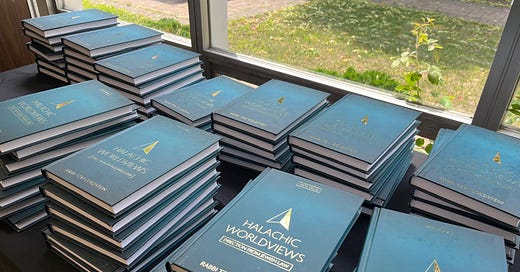Thanks to my mother’s advocacy and Skokie Yeshiva’s generosity, over a hundred copies of Halachic Worldviews were just given out to most of the students and rebbeim at my high school alma mater, Skokie Yeshiva (also known as Fasman Yeshiva High School).
Feeling a little nostalgic for my own high school graduation in 2011, and recognizing that a little context would help at least a few of these students crack open the sefer to see what’s inside, I wrote up a short letter for the graduating class.
I’m sharing it here in case it resonates with you (or, on the off chance you run a high school and would like to get copies for your students, as well).
Dear Seniors,
Mazel tov on your graduation from Skokie Yeshiva!
Fourteen years ago, I stood in your shoes. My friends and I enjoyed our trip to Gatlinburg, Tennessee, celebrated with the Bochur of the Year (Noam Itzhak, from Norfolk, Virginia), received our diplomas, and turned our thoughts to the future. The overwhelming majority of us were going to Israel, but to many different yeshivos. Would we stay in touch with each other? Were we going to change in yeshivah? In what way? What did the future hold for us?
I quickly learned that the Yeshiva, in partnership with my parents, had done a terrific job preparing me for yeshiva life. I had the vocabulary and reading skills I needed to navigate a daf Gemara, and I felt like enough of an insider to be able to embrace yeshivah life fairly quickly. Within a few short weeks, I was starting to spend long hours in the beis midrash, exploring Torah in a way I hadn’t been interested in doing before.
At the same time, though, I wondered: What is so important about this vast corpus that I’m pushing myself so hard to learn it and remember it? What does it even mean to love something written thousands of years ago about aspects of life that haven’t been directly relevant for hundreds, and even thousands, of years? In short, I knew that I was supposed to learn Torah, sacrifice for Torah, even love Torah — but I didn’t understand why.
Over time, I came across approaches that spoke to me in a deep way (of course, what resonated with me will not resonate for everyone). The first sefer I bought out of my own interest was the Sefer Hachinuch, which suggests reasons and basic content overviews for each of the taryag mitzvos; I remember being so taken by the idea that we could actually understand why Hashem wants us to do things like keep Shabbos, kosher, shatnez, and everything else. A couple of years later, I picked up Rabbi Samson Rephael Hirsch’s 19 Letters and Rav Soloveichik’s Halakhic Man and finally found what I was looking for: An approach to learning that unlocked the beauty and excitement I had heard so much about but had struggled to find until that point.
In an effort to share the discovery that I found so personally meaningful, I wrote the sefer you received today: Halachic Worldviews. The basic idea is that halachah/mitzvos/Torah is not just a rulebook detailing what you must and must not do, under threat of Divine or human punishment in this world or the next. Rather, it’s a program for imparting Divine ideals and values — worldviews — encouraging us to internalize them through both learning and repeated behavior. You’ve likely heard the idea that giving a penny to tzedakah every day turns you into a giver; that applies to all aspects of halachah, most powerfully (and sometimes, only) once you understand the ideas behind them.
I’m not going to tell you it’s an easy read. It’s a serious look at sixteen different sugyos, attempting to understand the different ways a certain idea was understood by the Rishonim and Acharonim before trying to extract the values at play. For example, Shabbos becomes a celebration of both a spiritual break from the world as well as an endorsement of the religious value in working during the six days of the week; a quirk in employment law leads to crucial contemporary messages for both employers and employees; a seemingly irrelevant slave law highlights something unexpected about our relationship with the Land of Israel.
I hope you take a few minutes to look through the sefer and see if the approach speaks to you the way it spoke to me (try “A Motzei Shabbos Jew,” “Making It Real,” or “Make Yourself at Home” — a few of my favorites).
Mazel tov again, and hatzlachah rabbah on next year!
Tzvi Goldstein





Please upload a bcopy of the Table of Contents.